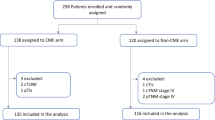Abstract
Background
Segmental resection of the colon or rectum for cancer is major surgery with substantial procedure-related morbidity and mortality. A steep increase in the frequency of early cancer and advanced adenoma detection has been evident these late years. Introducing more minimal invasive resection techniques may decrease procedure-related complications and mortality. We aimed to describe the results from introducing endoscopic full-thickness resection (eFTR) in a unit specialized in advanced endoscopic resection of colon neoplasias. Primary outcomes were R0 resection rate and complications.
Methods
endoscopic full-thickness resection was introduced in our unit in 2017. Patients were referred for eFTR based on indications: (i) completion of resection after unexpected cancer, (ii) suspicion of or clinically confirmed early cancer (T1) without signs of dissemination, or (iii) adenomas not suitable for other endoscopic resection techniques due to difficult position or recurrence. Data on eFTR procedures and follow-up were retrieved from patient journals.
Results
Thirty-seven eFTR procedures were commenced in the period of March 2017 until June 2020, and one of these was abandoned. The overall R0 resection rate was 83.3%. In subgroups of indications i–iii, it was 87.5, 80.0, and 80.0%, respectively. Three perforations and one case of late bleeding occurred. One patient died within 30 days due to late perforation. Six technical failures were evident including operator-induced failures. Five of the technical failures occurred in the first half of the procedures indicating the learning curve of the endoscopist.
Conclusion
Implementation of the eFTR procedure has been largely successful, especially in patients referred for completion of resection after unexpected cancer. Complication rates were acceptable, and the technique and quality increased significantly during the study. Careful selection of patients for eFTR is crucial for achieving successful resection. Size and position of lesion seem more important than indication. eFTR is not effective for lesions > 30 mm.
Graphical abstract


Similar content being viewed by others
References
Danish Colorectal Cancer Group (DCCG) (2020) National årsrapport 2019 [National Annual report 2019]
Brenner H, Stock C, Hoffmeister M (2014) Effect of screening sigmoidoscopy and screening colonoscopy on colorectal cancer incidence and mortality: systematic review and meta-analysis of randomised controlled trials and observational studies. BMJ 348:g2467
Freeman HJ (2013) Early stage colon cancer. World J Gastroenterol 19(46):8468–8473
Meier B, Stritzke B, Kuellmer A, Zervoulakos P, Huebner GH, Repp M et al (2020) Efficacy and safety of endoscopic full-thickness resection in the colorectum: results from the german colonic FTRD registry. Am J Gastroenterol 115(12):1998–2006
Schmidt A, Beyna T, Schumacher B, Meining A, Richter-Schrag HJ, Messmann H et al (2018) Colonoscopic full-thickness resection using an over-the-scope device: a prospective multicentre study in various indications. Gut 67(7):1280–1289
Aepli P, Criblez D, Baumeler S, Borovicka J, Frei R (2018) Endoscopic full thickness resection (EFTR) of colorectal neoplasms with the Full Thickness Resection Device (FTRD): clinical experience from two tertiary referral centers in Switzerland. United Eur Gastroenterol J 6(3):463–470
Kuellmer A, Mueller J, Caca K, Aepli P, Albers D, Schumacher B et al (2019) Endoscopic full-thickness resection for early colorectal cancer. Gastrointest Endosc 89(6):1180–9.e1
Boger P, Rahman I, Hu M, Ayaru L, Bhandari P, Chedgy F et al (2021) Endoscopic full thickness resection in the colo-rectum: outcomes from the UK Registry. Eur J Gastroenterol Hepatol 33(6):852–858
van der Spek B, Haasnoot K, Meischl C, Heine D (2018) Endoscopic full-thickness resection in the colorectum: a single-center case series evaluating indication, efficacy and safety. Endosc Int Open 6(10):E1227–E1234
Ichkhanian Y, Vosoughi K, Diehl DL, Grimm IS, James TW, Templeton AW et al (2021) A large multicenter cohort on the use of full-thickness resection device for difficult colonic lesions. Surg Endosc 35(3):1296–1306
Velegraki M, Trikola A, Vasiliadis K, Fragaki M, Mpitouli A, Dimas I et al (2019) Endoscopic full-thickness resection of colorectal lesions with the full-thickness resection device: clinical experience from two referral centers in Greece. Ann Gastroenterol 32(5):482–488
Andrisani G, Soriani P, Manno M, Pizzicannella M, Pugliese F, Mutignani M et al (2019) Colo-rectal endoscopic full-thickness resection (EFTR) with the over-the-scope device (FTRD((R))): a multicenter Italian experience. Dig Liver Dis 51(3):375–381
Zwager LW, Bastiaansen BAJ, Bronzwaer MES, van der Spek BW, Heine GDN, Haasnoot KJC et al (2020) Endoscopic full-thickness resection (eFTR) of colorectal lesions: results from the Dutch colorectal eFTR registry. Endoscopy 52(11):1014–1023
Fahmawi Y, Hanjar A, Ahmed Y, Abdalhadi H, Mulekar MS, Merritt L et al (2021) Efficacy and Safety of Full-thickness Resection Device (FTRD) for colorectal lesions endoscopic full-thickness resection: a systematic review and meta-analysis. J Clin Gastroenterol 55(4):e27–e36
Li P, Ma B, Gong S, Zhang X, Li W (2021) Efficacy and safety of endoscopic full-thickness resection in the colon and rectum using an over-the-scope device: a meta-analysis. Surg Endosc 35(1):249–259
von Helden A, Hildenbrand R, Sido B, Dumoulin FL (2019) Endoscopic full-thickness resection using an over-the-scope device for treatment of recurrent/residual colorectal neoplasia: a single-center case series. BMC Gastroenterol 19(1):121
Acknowledgements
None.
Funding
This work was not funded by any external source.
Author information
Authors and Affiliations
Corresponding author
Ethics declarations
Disclosures
Dr. Anders Høgh, MSc Ulrik Deding, Dr. Thomas Bjørsum-Meyer, Dr. Niels Buch, and Professor Gunnar Baatrup have no conflicts of interest or financial ties to disclose.
Additional information
Publisher's Note
Springer Nature remains neutral with regard to jurisdictional claims in published maps and institutional affiliations.
Supplementary Information
Below is the link to the electronic supplementary material.
Rights and permissions
About this article
Cite this article
Høgh, A., Deding, U., Bjørsum-Meyer, T. et al. Endoscopic full-thickness resection (eFTR) in colon and rectum: indications and outcomes in the first 37 cases in a single center. Surg Endosc 36, 8195–8201 (2022). https://doi.org/10.1007/s00464-022-09263-1
Received:
Accepted:
Published:
Issue Date:
DOI: https://doi.org/10.1007/s00464-022-09263-1




